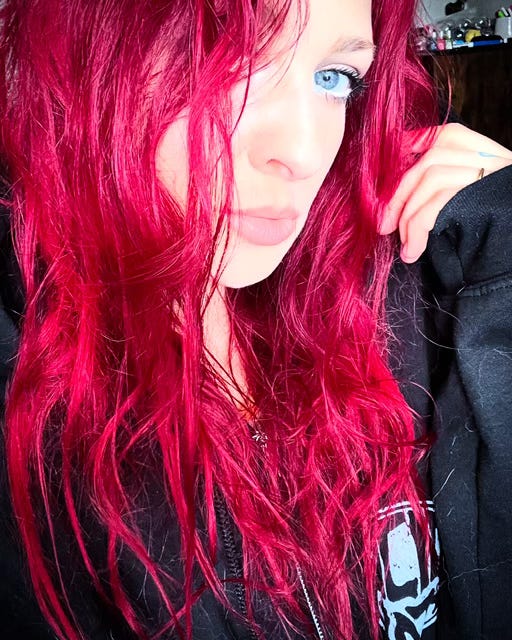
lives in Ohio with her husband, the writer Cory Bennet, her son, and their two rescue dogs. She is the author of Plastic Vodka Bottle Sleepover and the creator and editor of Black Lipstick, the internet boudoir of off-center beauty, literature, and culture. Since 2023, the publication has offered a fiercely intentional space for unconventional creative nonfiction, including narrative and hybrid essays, nontraditional book reviews, and interviews with artists, writers, and self-made icons. Black Lipstick is proud to maintain a visible, protected space for work by incarcerated writers within the mainstream media landscape—especially women and queer writers, who face greater barriers to publication—and to directly support contributors with 100% of proceeds from paid subscriptions and purchases made through the Bookshop.org storefront. Since its inception, Black Lipstick has co-hosted annual live readings with the Miss Manhattan Non-Fiction Reading Series at Niagara NYC.
1. Why Substack?
It started out as a grief project. I’d just had my third pregnancy loss in a calendar year, and I was in this weird psychic space where I was oversaturated with creative energy but also incredibly depressed and depleted. Most days all I wanted to do was lie down with the dead things in the marsh. But I also felt like, if I didn’t put this energy somewhere—if I didn’t give birth to something—I was going to get sick.
I thought of Henry Miller’s dictum, When you can’t create, you can work. Then I thought, What do I care about, what am I good at? The answers came together really quickly, like a reverse big bang, and Black Lipstick was born.
2. How long did it take you to find your groove?
Until now, I think—the magazine turned 2 this past February. There’s still a lot of experimentation on my end, but it took about this long to get clear on what I want this publication to be and how I can evolve with it.
3. How has it changed you?
I want to conservatively say it has given me a greater foothold of confidence. So much of the writing life is built on solitude, it can easily veer into isolation—like, here you are, in your head, all day long, and you write this stuff and so often have no idea whether anyone actually gives a shit. It’s important for me to know my work matters, but at the same time, when you sign on to be an artist, you can’t control that—you don’t get to choose when or how.
With this, I get regular proof, regular reminders. When I work with a writer I admire, for example, and they say working with me was the best editing experience of their life, that means something. Or when I work with writers who are incarcerated and they come away with an editorial contact, a publication credit, and a check, I know it matters to them on a practical level. But also, being able to maintain a space where their work is consistently visible matters, because people do need to read it. Things like that keep me going on my worst days.
4. What mistakes have you made?
So many! But one that stands out is overpromising on my own work.
For paid subscribers, I used to offer regular exclusive content in the form of two segments: Bootleg Livejournal—an unedited peek into my life—and Pyrokinesis, a craft memoir (craftoir?) in essays I was supposed to share draft chapters of. I’d seen writers doing similar stuff and was worried people wouldn’t want to pay for subscriptions if they weren’t getting special extras. But here’s what happened: the exclusive content I promised became a source of dread. It felt like something I had to deliver on, which made me not want to. And I failed on two counts here, because it wasn’t regular, and the content sucked. What’s funny is that when I discontinued these segments, it really didn’t affect my numbers. My new paid subscribers are here because they really just want to support the writers.
The craftoir, I killed it with premature exposure. I should have known better. I did know better. But I listened to the advice, about what you should do on Substack as a writer—tease your work, invite people in, build your brand, and so on—and I tried doing all that. But deep creative work—work that needs time to incubate, that feeds off your energy—doesn’t respond well to those conditions. Even though probably fewer than fifty people read it, the concept felt ruined for me. Like opening the door to the darkroom. I scrapped it all less than a year in, but it was too late. The project had flamed out. I don’t want to do it anymore.
5. To pay or not to pay?
Honestly, if you can afford to support writers with paid subscriptions, that’s great. But it’s unrealistic to pay for everything you like to read, and there’s also something gauche about writers who try to aggressively monetize by paywalling everything.
On the one hand, there’s no reason to turn down the option of payment. But on the other, enabling payment can come with a sense of pressure to produce content you think people would want to pay for. Which like, who knows what that is? It’s hard because the capital-C Content we all roll our eyes at seems to do numbers, but good writing seems to be what individuals prefer. And now, because of a handful of people making real money on Substack, there’s this imperative to monetize and maximize. But when you introduce that transactional element, you lose something. You can’t be as free.
6. What artistic and technical choices have you made?
I’ve only ever published nonfiction. From a practical standpoint, I think it does better on the internet. Also, I work alone. When it comes to editorial style and ethos, I believe a singular vision is best. As for long-term sustainability, I’ve leaned into an irregular publishing cadence. For me, I’ve found that the best schedule is no schedule.
7. What’s been the effect on your writing?
It’s made me take a more careful approach to my fiction, to the work that takes longer to cook. Knowing I can publish whatever I want whenever has, strangely, made me care less about publishing. And it’s taken some pressure off the work itself. Writing is still the prime mover of my life, but it doesn’t have to be the only thing that carries me, or the only thing I can give the world. You know? It makes me feel better knowing if I die tomorrow, my last meaningful contribution won’t be noveldraftfinalFINAL_srsly_19.0.docx.
8. In it for the long haul?
Absolutely.
Subscribe to :







I love discovering great writers with unique vision here. Thanks, Eleanor and Mila.
I’m endlessly amazed by the variety of writers and their stories and this was no exception. I loved what you said, Mila, about making the mistake of listening to advice even when you knew better — there’s so much of it flooding every platform, and it’s so easy to get sucked in to thinking we need to follow it, I have made the same mistake often (and will no doubt repeat it when I get excited or carried away about something without thinking it through properly!) And to pay or not to pay — I couldn’t afford to pay for all the publications that I love to read, but some of my absolute favourites that I do pay for, don’t paywall (or only their archives) and I pay because their writing is incredible. Another great interview Eleanor, thank you!